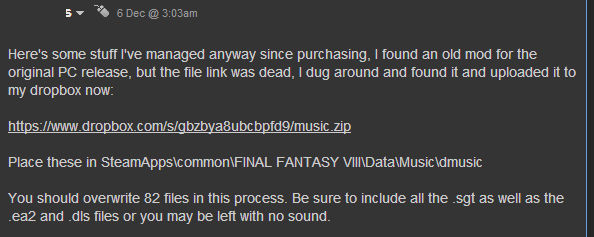A recent re-release of Final Fantasy VIII (the best Final Fantasy, in case you were wondering) has caused a bit of a stir in modding land, because it shipped with MIDI music files from the original PC release instead of the far superior soundtrack files from the PS1 release way back in 1999.
What this means in practice is that lots of people wanting to upgrade their music went off downloading random files and (in many cases) executables to get their “This music is considerably better but why is my PC on fire” fix.
This tutorial had to be updated with fresh download links after gamers were ending up with programs on their PCs they didn’t want due to download managers being used.

Elsewhere, Steam users were complaining about virus alerts in relation to executables associated with changing the music files. There were also issues related to upgrading the quality of the FMVs (full motion videos) included with the game – typically, unrelated installers end-users are clicking on when using free file download sites.
There are now a number of other mods that have been bashed into shape with a view to “fixing” the music – however, the problem with modding is it often encourages end-users to download and run whatever they can get their hands on.
Here’s someone “digging around” for old mods, grabbing files from somewhere and uploading them to Dropbox. While the files themselves may well be benign, it’s simply amazing how quickly a 40 odd page thread can descend into horribly unsafe computing practices.

Later on, in reference to an executable related to one of the patches:
“I’m not entirely sure what the EXE does”

That really isn’t a good thing to be saying in relation to files you’re going to be running on your system.
“Did you right click the exe and select run as Administrator?” – Link
And of course, let’s not forget a timeless classic:
“Try disabling your antivirus, it worked for me”

The horror.
A lot of PC game modding relies on injecting code into certain processes to get the job done, which often results in bad things downloaded and executed on the computer.
If you want to keep things a little safer, it’s worth keeping in mind that Steam has a Workshop platform, which enables quick and easy distribution of mods. The games in Steam Workshop are typically a lot easier to mod which is why they’re on there in the first place and the files aren’t “random executables some guy found and put on a free file host, also he doesn’t know what they do so good luck with that”.
There are plenty of modding sites, but in general you should stick to major modding forums and portals. There’s plenty of commentary / feedback on the mods on offer, and any rogues slipping through the net don’t tend to last long. A word of advice – some titles can break horribly if you load up a bunch of mods in the wrong order (yes, load order is a thing here). As a result, most people tend to download mod managers for sorting / fixing. These managers are often executable programs and gamers should take care not to get stung by random files pretending to be something else.
Additionally, more programs may be required to take advantage of scripting in a particular game. It’s not uncommon to see gamers load Skyrim via SKSE (Skyrim Script Extender) rather than directly through the “play game” button in Steam, so be prepared to juggle multiple files and folders.
It’s not just the classics you have to worry about – new games are a frequent target of scams and Malware, and modding really is one area of gaming where bad files can be downloaded at a terrifyingly fast rate. It only takes one file to infect a machine, yet modders frequently download files and folders by the dozen.
It seems the official word from Square Enix is they’re going to upgrade the soundfiles sometime soon so my advice would be to stop downloading random files and hoping for the best. Continue to enjoy your game whether rolling with the old MIDI tracks or the upcoming reworked music and please be careful what you’re downloading.
It can be rather tricky to mod a PC back to full health…
Christopher Boyd










